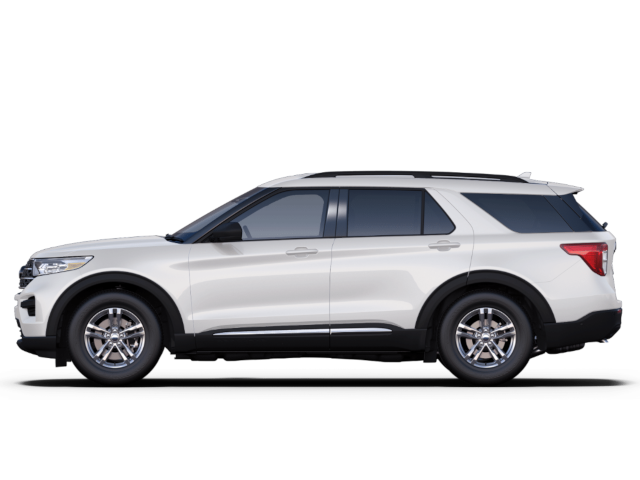A true pioneer in the category of mid-size utility models, the Ford Explorer has also been one of the best-selling models on the market over the last 20 years. That said, the last overhaul of the model dates back to 2011, so it was time to move on because the truck was starting to show its age.
Entirely redesigned
For 2020, Ford went all-in and the model has been redesigned at all levels. It has a new platform with a rear-wheel-drive configuration instead of front-wheel, which will ensure better towing capacity. Though while Americans will get a two-wheel-drive version, only AWD will be sold in Canada, and it will offer 5,600 lb of towing capacity.
Physically, the new Explorer takes on a more athletic appearance, and there are winks at Ford big brother the Expedition. The style also varies somewhat depending on the version chosen. The XLT and the new hybrid version feature the most-sober styling. The Platinum model offers specific colours and chrome rims unique to this model. Visually, the Explorer ST stands out courtesy a black mesh grille insert, special design on the liftgate, lower body details, roof-rack side rails and skid plate elements. The black wheels are also used to hide the dust created by the more efficient brakes.
Several engines, including a hybrid
The new Explorer comes in no fewer than three engines, in four flavours. You have a 2.3L EcoBoost that develops 300 hp and 310 lb-ft of torque, which serves as the entry-level engine on the XLT and Limited models.
Then comes the new hybrid with a 3.3L V6 engine generating a combined power of 318 hp (gas + electric motor) and delivering an estimated range of 800 km, according to EPA figures.
The other engine is a 3L turbo V6. This engine bloc, borrowed from the Lincoln Continental, produces 365 hp and 380 lb-ft of torque in the Platinum version and 400 hp with 415 lb-ft of torque in the new ST version.
All engines are mated to a 10-speed automatic (first seen in the F-150). Take note that the power obtain with turbo engines is with 93 octane fuel.
A nice cocoon
Ford has long had the strongest technology content among domestic car manufacturers. The Explorer comes standard with the Ford Co-Pilot360 driver assistance technology that offers Pre-Collision assist with automatic braking, which includes pedestrian detection, forward collision warning and dynamic brakes.
There’s also the blind spot information system with cross-traffic alert, lane-keeping system, rearview camera with built-in lens cleaner and auto headlamps with auto high-beams.
Evasive Steering Assist, which provides steering support to help avoid a collision; and Post-Impact Braking provides braking after a collision to lessen injury and damage caused by a secondary crash event are optional.
The three rows of seats can accommodate seven people, or six if you opt for second-row captain seats.
Regardless of the row in which they sit, passengers will enjoy the FordPass Connect, a standard feature that provides wireless connectivity to up to 10 mobile devices through the 4G LTE (subscription) network. FordPass Connect allows drivers to connect remotely to their Explorer. Using their smartphones, they can lock, unlock, locate and start their vehicle, as well as monitor their main diagnostics in real time.
You also have 18-inch wheels, LED headlights, rear safety glass, power liftgate, rear parking sensors, rear view camera, dual zone automatic climate control, driver information, an eight-way power driver seat, a 40/20/40 split second-row bench seat, and a 50/50 split third-row bench seat.
The updated SYNC 3 system supports Apple CarPlay and Android Auto without forgetting the Waze navigation tool. The basic centre screen is 8 inches (a 10-inch screen is optional) and mounted vertically. High-end models are dressed with a Bang & Olufsen 12- to 14-speaker audio system that provides up to 980 watts of power.
A more-inspired drive
Driving the 2020 Explorer is an exercise in quiet. Ford has invested in noise reduction systems, adding in three noise canceling technologies: the double-wall dashboard - a Ford first - and acoustic glass, as well as active noise control on hybrid models. So you have a serene environment for cruising on the highway.
Speaking of roads, the Explorer has lost none of its off-road capabilities. The driver has the choice of seven adjustable drive modes to fit various road conditions: Normal, Sport, Trail, Slippery Surface, Snow and Deep Sand and an Eco mode for the hybrid model that is also very able off-road, by the way.
For those who want more thrills, the new ST version is for you. With 400 hp available out of the box, buyers can upgrade with an ST Street Pack or ST Track Pack. Both bring with them 21-inch aluminum wheels with differing levels of performance brakes and feature larger vented rotors, red-painted brake calipers with stainless steel pistons and larger brake pads for even better stopping power. The performance package will arrive later in Canada.
In Sport mode, the steering system tightens for sportier reaction, the gas pedal responds more aggressively, gears hold longer and shift quicker, and an enhanced engine note plays through the cabin.
The new architecture, which will be shared with the Lincoln Aviator, is very quiet and offers superior handling. Ford engineers who made tests with the ST model claim it can attain a top speed of 143 mph or over 225 km/h.
Conclusion
Production of the Explorer is already underway at Ford’s Chicago plant and the first 2020 models will arrive in dealerships by the end of the summer. Pricing for the base model will start around $45,000. An ST model will go for $60,000 before you check off any options, and the Platinum version sits at the top of the range at $65,000.
We like
Wide variety of models
Generous space
Quiet interior
A lot of embedded technology
We like less
Difficult to transform a two-ton truck into a lithe athlete
You need to feed the beast 93 octane
On the pricy side
Consult our listing of pre-owned Ford vehicles available in your region of Canada
Road Tests and Reviews









